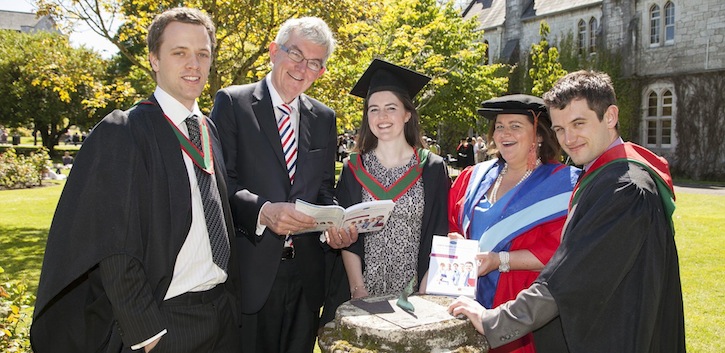2013 Press Releases
SAFE hands for patients and docs

The next generation of doctors took more than a parchment with them as they graduated from UCC last Thursday (30 May).
The medicine graduates became the first in the country to add a bespoke life-saving tool to their medical arsenal – SAFEMED.
The 148 UCC graduates enter a world of clinical practice that is rewarding but also challenging. Concerns relating to stress and burn out of doctors, perhaps most particularly junior doctors are well documented. The end product of these destructive forces can present as one or more of the 3 big Ds (depression, heavy drug or alcohol use). This can in turn have a devastating impact on patient safety.
The School of Medicine at UCC has taken an approach different to any other medical school in the world by implementing a unique cognitive behavioural coaching programme called SAFEMED to protect and promote the wellbeing and emotional health of their medical students. The students became the first in the country to be presented with the SAFEMED handbook as they graduated. While also usable as a standalone support, the tools and skills outlines in the handbook are the culmination of several years training on the overall SAFEMED programme, now provided to all medical students at UCC.
The ethos behind the bespoke training tool ties into the recently announced Healthy Ireland – A Framework for Improved Health and Wellbeing 2013-2025. The health and wellbeing of the doctors of tomorrow is a vital strand of this framework. By teaching the students on an on-going basis the emotional, behavioural and life skills required to identify and deal with the stresses and strains of a complex medical environment, a practical stress management plan emerges. The training approach used had been refined over several years of experience.
"Our work, and previous studies have highlighted concerns about high levels of stress in doctors,” says Dr Margaret O’Rourke, Director of Behavioural Science in the School of Medicine UCC and author and researcher behind the programme.
“SAFEMED raises awareness of the importance of doctor health and well-being when it comes to high quality and safe patientcare. It teaches valuable life skills that benefit doctors and patients alike. The health service is one of the country's largest employers and the health of its workforce is crucial to the delivery of the improvements in patient care envisaged in Healthy Ireland strategy. Tomorrow’s doctors through their families, friends and patients encounter thousands ofpeople every day and have significant opportunity to influence by example and education. It is clear that healthcare in the future will have a stronger emphasis on prevention than in the past and if the health service is to be seen to practice what it preaches, it will be important that its own staff take action to reduce their own risk factors and are seen to champion stress regulation and lifestyle improvements".
Dr Siún O Flynn, Head of Medical Education at UCC comments: "All doctors must develop some resilience as they will work in challenging clinical environments constantly dealing with factors beyond their control but channelling the development of this resilience is important. Preserving their own well-being is also vital. SAFEMED teaches our graduates to employ a toolkit of successful strategies which all high performing doctorsconsciously or subconsciously draw on all the time. At the end of medical school there are some books which may not be opened again, but this handbook is definitely one they will return to".
Professor George Shorten, Dean of Medicine comments: “The doctor mindful of his or her own psychological health through the supports that SAFEMED provides will be better equipped than ever before to ensure the highest standards of empathy and care towards their patients. The benefits also extend to our doctors of the future, who in their years to come at UCC will have the advantage of being able to draw on a wonderful support system unlike any other in in the country, shutting down the sometimes all encompassing stress faced in the medical profession”.
The students received their commencement speech from Dr. Ambrose McLoughlin, Secretary General of the Department of Health and Chairman of the Board of the HSE, who praised the support provided by SAFEMED.
Follow the coverage in the Irish Examiner: 'Medical graduates get antidote to stress'
